 W
WBrainstorms: Philosophical Essays on Mind and Psychology is a 1978 book by American philosopher Daniel Dennett. The book is a collection of seventeen essays in which Dennett reflects on the early achievements of artificial intelligence to develop his ideas on consciousness, theory of mind, and free will.
 W
WCato Maior de Senectute is an essay written by Cicero in 44 BC on the subject of aging and death. To lend his reflections greater import, Cicero wrote his essay such that the esteemed Cato the Elder was lecturing to Scipio Africanus and Gaius Laelius Sapiens.
 W
W"Compensation" is an essay by Ralph Waldo Emerson. It appeared in his book Essays, first published 1841. In 1844, Essays: Second Series was published, and subsequent republishings of Essays were renamed Essays: First Series.
 W
WThe full original title of this 1727 essay by Daniel Defoe was "Conjugal Lewdness or, Matrimonial Whoredom", though he was later asked to rename it for the sake of propriety. The modified title became "A Treatise Concerning the Use and Abuse of the Marriage Bed". The essay dealt primarily with contraception, comparing it directly with infanticide. Defoe accomplished this through anecdotes, such as a conversation between two women in which the right-minded chides the other for asking for "recipes" that might prevent pregnancy. In the essay, he further referred to contraception as "the diabolical practice of attempting to prevent childbearing by physical preparations."
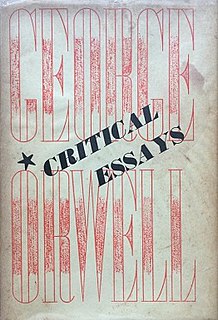 W
WCritical Essays (1946) is a collection of wartime pieces by George Orwell. It covers a variety of topics in English literature, and also includes some pioneering studies of popular culture. It was acclaimed by critics, and Orwell himself thought it one of his most important books.
 W
WDe Brevitate Vitae is a moral essay written by Seneca the Younger, a Roman Stoic philosopher, sometime around the year 49 AD, to his father-in-law Paulinus. The philosopher brings up many Stoic principles on the nature of time, namely that people waste much of it in meaningless pursuits. According to the essay, nature gives people enough time to do what is really important and the individual must allot it properly. In general, time is best used by living in the present moment in pursuit of the intentional, purposeful life.
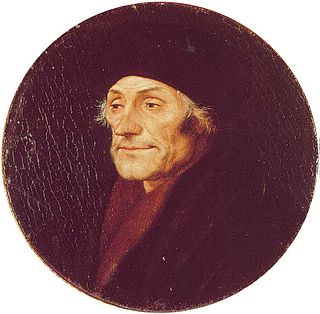 W
WDe libero arbitrio diatribe sive collatio is the Latin title of a polemical work written by Desiderius Erasmus of Rotterdam in 1524. It is commonly called The Freedom of the Will in English.
 W
WDe Providentia is a short essay in the form of a dialogue in six brief sections, written by the Latin philosopher Seneca in the last years of his life. He chose the dialogue form to deal with the problem of the co-existence of the Stoic design of providence with the evil in the world—the so-called "problem of evil."
 W
WDe Spectaculis, also known as On the Spectacles or The Shows, is a surviving moral and ascetic treatise by Tertullian. Written somewhere between 197-202, the work looks at the moral legitimacy and consequences of Christians attending the circus, theatre, or amphitheatre.
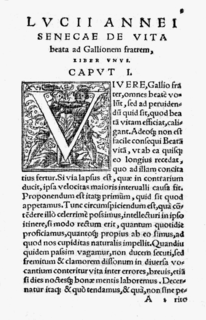 W
WDe Vita Beata is a dialogue written by Seneca the Younger around the year 58 AD. It was intended for his older brother Gallio, to whom Seneca also dedicated his dialogue entitled De Ira. It is divided into 28 chapters that present the moral thoughts of Seneca at their most mature. Seneca explains that the pursuit of happiness is the pursuit of reason – reason meant not only using logic, but also understanding the processes of nature.
 W
WThe Discourse on Voluntary Servitude is a work attributed to Étienne de La Boétie by Montaigne. The text was published clandestinely in 1577.
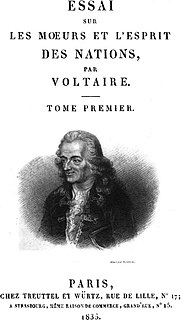 W
WEssai sur les mœurs et l'esprit des nations is a work by the French writer, historian, and philosopher Voltaire, published for the first time in 1756. It discusses the history of Europe before Charlemagne until the dawn of the age of Louis XIV, also addressing the colonies and the East.
 W
WEssayes: Religious Meditations. Places of Perswasion and Disswasion. Seene and Allowed (1597) was the first published book by the philosopher, statesman and jurist Francis Bacon. The Essays are written in a wide range of styles, from the plain and unadorned to the epigrammatic. They cover topics drawn from both public and private life, and in each case the essays cover their topics systematically from a number of different angles, weighing one argument against another. While the original edition included 10 essays, a much-enlarged second edition appeared in 1612 with 38. Another, under the title Essayes or Counsels, Civill and Morall, was published in 1625 with 58 essays. Translations into French and Italian appeared during Bacon's lifetime. In Bacon's Essay, "Of Plantations" published in 1625, he relates planting colonies to war. He states that such plantations should be governed by those with a commission or authority to exercise martial law.
 W
WThe Essays of Michel de Montaigne are contained in three books and 107 chapters of varying length. They were originally written in Middle French and were originally published in the Kingdom of France. Montaigne's stated design in writing, publishing and revising the Essays over the period from approximately 1570 to 1592 was to record "some traits of my character and of my humours." The Essays were first published in 1580 and cover a wide range of topics.
 W
WLes Essais is a 1588 edition of Michel de Montaigne's Essais held by the Bibliothèque municipale de Bordeaux. The book contains about 1300 manuscript corrections and annotations made by Montaigne between the summer of 1588 and the 13 September 1592. This unique document sheds light on the way Montaigne worked and on the genesis of the final edition of Les Essais.
 W
W"Free Thought and Official Propaganda" is a speech delivered in 1922 by Bertrand Russell on the importance of unrestricted freedom of expression in society, and the problem of the state and political class interfering in this through control of education, fines, economic leverage, and distortion of evidence.
 W
WZur Geschichte der Religion und Philosophie in Deutschland is a three-part essay by Heinrich Heine, each part referred to as a "book". He wrote them in exile in Paris in 1833/34. They were initially published in French, titled De l'Allemagne depuis Luther, in the magazine Revue des deux Mondes in 1834. The first publication in German was as part of Der Salon. Zweiter Band the same year.
 W
WThe feminist philosophy journal Hypatia became involved in a dispute in April 2017 that led to the online shaming of one of its authors, Rebecca Tuvel, a tenure-track assistant professor of philosophy at Rhodes College in Memphis. The journal had published a peer-reviewed article by Tuvel in which she compared the situation of Caitlyn Jenner, a trans woman, to that of Rachel Dolezal, a white woman who identifies as black. When the article was criticized on social media, scholars associated with Hypatia joined in the criticism and urged the journal to retract it. The controversy exposed a rift within the journal's editorial team and more broadly within feminism and academic philosophy.
 W
WThe Myth of Sisyphus is a 1942 philosophical essay by Albert Camus.
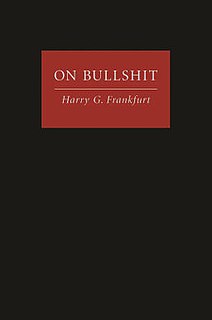 W
WOn Bullshit is a 2005 book by American philosopher Harry G. Frankfurt which presents a theory of bullshit that defines the concept and analyzes the applications of bullshit in the context of communication. Frankfurt determines that bullshit is speech intended to persuade without regard for truth. The liar cares about the truth and attempts to hide it; the bullshitter doesn't care if what he or she says is true or false, but cares only whether the listener is persuaded. Frankfurt's philosophical analysis of bullshit has been analyzed, criticized and adopted by academics since its publication.
 W
WOn the Freedom of the Will is an essay presented to the Royal Norwegian Society of Sciences in 1839 by Arthur Schopenhauer as a response to the academic question that they had posed: "Is it possible to demonstrate human free will from self-consciousness?" It is one of the constituent essays of his work Die beiden Grundprobleme der Ethik .
 W
WPerpetual Peace: A Philosophical Sketch is a 1795 book authored by German philosopher Immanuel Kant. In the book, Kant advances ideas that have subsequently been associated the democratic peace, commercial peace, and institutional peace.
 W
WPersecution and the Art of Writing, published in 1952 by the Free Press, is a book of collected articles written by Leo Strauss. The book contains five previously published essays, many of which were significantly altered by Strauss from their original publication. The general theme of the book is the relationship between politics and philosophy. The thesis of the book is that many ancient and early modern political philosophers, in order to avoid persecution, hid their most heterodox ideas within their texts.
 W
WThe Rebel is a 1951 book-length essay by Albert Camus, which treats both the metaphysical and the historical development of rebellion and revolution in societies, especially Western Europe.
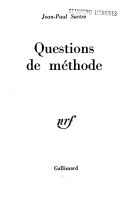 W
WSearch for a Method or The Problem of Method is a 1957 essay by the philosopher Jean-Paul Sartre, in which the author attempts to reconcile Marxism with existentialism. The first version of the essay was published in the Polish journal Twórczość; an adapted version appeared later that year in Les Temps modernes, and later served as an introduction for Sartre's Critique of Dialectical Reason. Sartre argues that existentialism and Marxism are compatible, even complementary, even though Marxism's materialism and determinism might seem to contradict the abstraction and radical freedom of existentialism.
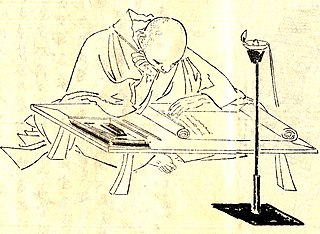 W
WTsurezuregusa is a collection of essays written by the Japanese monk Yoshida Kenkō between 1330 and 1332. The work is widely considered a gem of medieval Japanese literature and one of the three representative works of the zuihitsu genre, along with Makura no Sōshi and the Hōjōki.
 W
W"What Is It Like to Be a Bat?" is a paper by American philosopher Thomas Nagel, first published in The Philosophical Review in October 1974, and later in Nagel's Mortal Questions (1979). The paper presents several difficulties posed by consciousness, including the possible insolubility of the mind-body problem owing to "facts beyond the reach of human concepts", the limits of objectivity and reductionism, the "phenomenological features" of subjective experience, the limits of human imagination, and what it means to be a particular, conscious thing.
 W
WWhat Is Literature?, also published as Literature and Existentialism,) is an essay by French philosopher and novelist Jean-Paul Sartre, published by Gallimard in 1948. Initially published in freestanding essays across French literary journals Les Temps modernes, Situations I and Situations II, essays "What is Writing?" and "Why Write?" were translated into English and published by the Paris-based literary journal Transition 1948. The English translation by Bernard Frechtman was published in 1950.